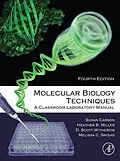Molecular Biology Techniques: A Classroom Laboratory Manual, Fourth Edition is a must-have collection of methods and procedures on how to create a single, continuous, comprehensive project that teaches students basic molecular techniques. It is an indispensable tool for introducing advanced undergraduates and beginning graduate students to the techniques of recombinant DNA technology-or gene cloning and expression. The techniques used in basic research and biotechnology laboratories are covered in detail. Students will gain hands-on experience on subcloning a gene into an expression vector straight through to the purification of the recombinant protein. - Presents student-tested labs proven successful in real classroom laboratories - Includes a test bank on a companion website for additional testing and practice - Provides exercises that simulate a cloning project that would be performed in a real research lab - Includes a prep-list appendix that contains necessary recipes and catalog numbers, providing staff with detailed instructions
Autorentext
Dr. Carson's area of scientific expertise is in molecular mechanisms of bacterial pathogenesis. She currently serves as the Director of the Master of Microbial Biotechnology Program and as a Fellow in the Office of Faculty Excellence. Prior to this appointment, she led the NC State Quality Enhancement Plan (QEP), focused on faculty development to cultivate students' critical and creative thinking skills across disciplines. During that period, she also acted as Executive Director of Academic Enrichment Programs, overseeing the Office of Undergraduate Research, Fellowship Advising, and the University Honors and Scholars Programs. Dr. Carson spent over ten years leading curriculum development for the NC State Biotechnology Program. She has received multiple awards for teaching excellence and innovation and was a member of the Howard Hughes Science Education Alliance, promoting and implementing inquiry-guided learning and authentic research in undergraduate curricula. She authored three molecular biology lab manuals and has published numerous peer-reviewed papers in the area of course and curriculum development. She has mentored over 100 undergraduate students in research projects and was the PI and Director of the National Science Foundation (NSF)-funded Integrative Plant and Microbial Systems Research Experience for Undergraduates (REU) Program for over a decade. Most recently, she completed a 2-year rotation at the National Science Foundation in the Directorate for Education and Human Resources. Within the Triangle community, she has served on the Board of Directors of the Wake County Beekeeping Association and the Triangle Swing Dance Society.Dr. Heather Miller is an Assistant Professor of Biochemistry in the Chemistry Department at High Point University (High Point, NC). She graduated from Clarion University of Pennsylvania (Clarion, PA) with a B.S. in Molecular Biology/Biotechnology, and from Duke University (Durham, NC) with a Ph.D. in Molecular Genetics and Microbiology. She completed a teaching postdoctoral position in the Biotechnology Program at North Carolina State University (Raleigh, NC). Her area of scientific expertise is RNA biology. Her research focuses on HIV-1 gene expression and the coupling of transcription and splicing in humans. She has taught at the college level for nine years, and is engaged in the scholarship of teaching and learning.Dr. Melissa C. Srougi is an Assistant Professor of Biochemistry at High Point University. She graduated from the University of Toledo (Toledo, OH) with a B.S. in Biology, and from Case Western Reserve University (Cleveland, OH) with a Ph.D. in Pharmacology. Her scientific areas of expertise are in experimental cancer chemotherapeutic agents and mechanisms of chemotherapeutic resistance. Dr. Srougi actively trains undergraduate research students in her laboratory. In addition, she has developed and taught a variety of inquiry-based college level science courses and has published and presented a number of peer-reviewed papers in the scholarship of teaching and learning.Dr. Witherow graduated from Rollins College (Winter Park, FL) with an A.B. in Chemistry, and from the University of Miami (Miami, FL) with a Ph.D. in Molecular and Cellular Pharmacology. His research has focused primarily on G protein-mediated signal transduction processes in mammalian systems. Following two research postdoctoral fellowships, Dr. Witherow served as a teaching postdoctoral fellow at North Carolina State University, where he published and presented multiple papers in the field of science education and developed a passion for teaching. He is currently an Associate Professor at The University of Tampa, where he has been teaching undergraduate students since 2011.
Inhalt
Part I: Manipulation of DNA Advanced Alternatives Within Part I 1. Getting Oriented; Practicing With Micropipettes 2. Purification and Digestion of Plasmid (Vector) DNA 3. Completion of Vector Preparation and Polymerase Chain Reaction Amplification of egfp 4. Preparation of Insert DNA (egfp) PCR Product 5. DNA Ligation and Transformation of Escherichia coli
Part II: Screening Transformants Advanced Alternatives Within Part II 6. Screening of Transformants, Part I 7. Screening of Transformants, Part II 8. Analysis of DNA Sequence From a Positive Clone, Part II
Part III: Expression, Detection, and Purification of Recombinant Proteins from Bacteria Advanced Alternatives Within Part III 9. Expression of Fusion Protein from Positive Clones, SDS_PAGE and Western Blot: Part I 10. Expression of Fusion Protein from Positive Clones, SDS_PAGE, and Western Blot: Part II 11. Extraction of Recombinant Protein From Escherichia coli Using a Glutathione Affinity Column 12. Analysis of Purification Fractions
Part IV: Analysis of mRNA Levels 13. Total RNA Purification 14. Analysis of gst::egfp mRNA Levels by RT-qPCR: Part I 15. Analysis of gst::egfp mRNA Levels by RT-qPCR: Part II 16. Analysis of gst::egfp mRNA Levels by Semiquantitative RT-PCR: Part I 17. Analysis of gst::egfp mRNA Levels by Semiquantitative RT-PCR: Part II
Part V: Modulation of Gene Expression 18. Culturing Mammalian Cells 19. Transient Transfection of Mammalian Cells 20. RNAi-Mediated Knockdown of EGFP: Part I 21. RNAi-Mediated Knockdown of EGFP: Part II 22. RNAi-Mediated Knockdown of EGFP: Part III 23. CRISPR-Mediated Knockout of EGFP: Part I 24. CRISPR-Mediated Knockout of EGFP: Part II 25. Advanced CRISPR: Part I 26. Advanced CRISPR: Part II 27. Interim Laboratory Session 28. Advanced CRISPR: Part IV 29. Advanced CRISPR: Part V 30. Advanced CRISPR: Part VI
Appendix A: Equipment B: Prep List C: Preparation of Competent Escherichia coli Cells D: Pre-Lab Questions
